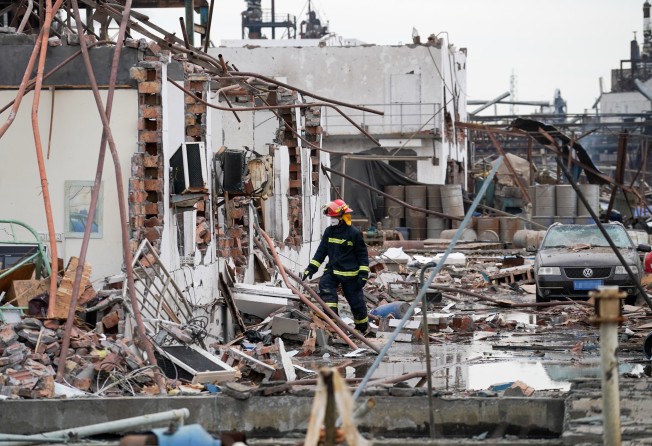Mainland officials must heed calls to maintain workplace safety
- An explosion at a pesticide plant in Jiangsu that killed almost 80 people once again underlines that duty of care should come before financial concerns

An aerial view of China’s latest workplace accident in Yancheng, Jiangsu province, looks like a wartime bomb crater surrounded by the devastation of an industrial estate.
The human toll of an explosion at a pesticide plant – at least 78 dead and 640 injured – reinforces the analogy. It is true that industrial disasters can happen anywhere – though not often on a scale as big as this.
When they do, as a rule, investigations establish causes and recommend steps to ensure they do not recur. But the Yancheng blast is not such a one-off.
Tragically, it perpetuates a pattern of deadly negligence of industrial safety hazards on the mainland that has cost hundreds of lives over the past few years.
Those responsible for ignoring warnings from work safety inspections must be punished. But as the latest tragedy shows, accountability alone has not been an effective deterrent in the past to irresponsible laxity that has cost lives.
Work safety inspections must be followed up to ensure prompt compliance with recommendations.
Accidents in the last few years attributable to negligence include blasts at a poultry farm in Jilin province in which 121 people died, another at a Jiangsu car parts factory that claimed 146 lives, and a third at a chemical warehouse in Tianjin that killed 173 people.
It does not take hindsight to see that the blast at the Jiangsu Tianjiayi Chemical plant at the Chenjiagang Industrial Park in Xiangshui county, Yancheng, was an accident waiting to happen.
The authorities had fined and warned the plant’s owners and directors several times for violating safety rules, but allowed it to keep operating, according to Ministry of Emergency Management investigators.
The ministry team in this case has again criticised local authorities and company bosses for failing to fix safety problems identified after earlier accidents at the industrial estate.
In February last year, for example, the State Administration of Work Safety told the provincial authorities to ask Tianjiayi to address 13 potential safety hazards found during a safety inspection a month earlier.
If heeded, the warning may have prevented the accident and saved lives. The injured include people who were hundreds of metres away from the blast centre.
Zhu Xiaoyiung, from Wangshang about 1km away, said the industrial estate was a “time bomb” but the government had insisted on building it close to the residential area.
A message from President Xi Jinping, on a European tour, conveyed more urgency than the customary condolences from state leaders.
Officials should heed his call to draw lessons from recent tragic cases to eliminate hazards and strictly implement the safety production accountability system. They need to be more mindful that their duty of care to people comes before purely financial concerns.